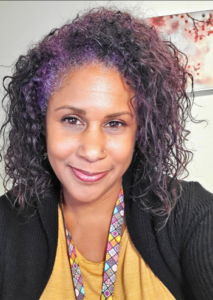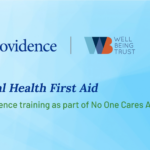Throughout Black History Month, we’re sharing stories from Providence caregivers who specialize in behavioral health care. We are also featuring student mental health advocates who are members of Work2BeWell’s National Student Advisory Council.

We recently spoke with Divinity about the unique challenges Black individuals face when it comes to mental health and her hopes for the future of behavioral health care and support.
What led you to pursue a career in mental health?
This is my calling. It’s always been what I’ve done. I see connection in what people have gone through in life and how they respond to the world around them, and I’ve always wanted to uplift people.
Before becoming a licensed therapist, I worked in a pre-school. I had an opportunity to shadow teachers who focused on the social and emotional growth of the children. I loved what they were doing – helping children and their families. I decided to change careers and I’ve never looked back.
In my current role as a behavioral health family therapist, I see a wide range of people.
I work with youth as young as 13 and some of my patients are in their 90s. This work is very fulfilling.
What unique challenges do Black individuals face when it comes to mental health?
There has been a frame of thought in the Black community, which I’ve also learned spans throughout other communities of color, that if you admit you need help, it means something is wrong and that you’re not strong. And then there’s also the thought that seeking counseling is what other people do. Another layer is the connection a faith community and some may believe that their faith isn’t strong if they seek counseling. So, it’s a combination of various stigmas that impact Black communities.
To address this, we must continue to de-stigmatize mental health, educate and engage our communities to help reduce stigma related to seeking mental health care, and share resources and tools that support mental health and well-being in Black communities.
We also need to recognize and acknowledge that there’s generational trauma that stems from the being descendants of enslaved Black people. It’s important for mental health professionals to be mindful of this and the impact of this trauma in Black communities.
How can mental health professionals better understand and serve the needs of the Black community?
I think it’s really important for mental health professionals to, as much as they can, have an understanding of our history and be very understanding of our strong ties to our faith and be able to speak to that.
I also think that it’s important to be able to meet people where they are. There is a difference in the way African Americans walk through the world. In many cases, our anxiety levels might be higher because we are “tiptoeing” in society (for various reasons e.g. systemic racism, discrimination). So being able to walk into space with a person of color and understand what we’re dealing with is extremely important.
What are your hopes for the future of mental health care and support for Black communities?
Representation and visibility are important, and it is my hope is that more African Americans enter the mental health field to provide care and to educate others in this field. That is my number one hope.
View and share resources that support mental health and well-being
Providence’s Well Being Trust recently updated its guide that includes resources that support mental health and well-being in Black communities.
Explore this curated collection of articles, guides, podcasts, and other resources – Prioritizing Black Mental Health: A guide to resources and support – Well Being Trust.
Read more feature stories in the Mental Health Spotlight Series: Prioritizing Mental Health Support in Black Communities
- Jayda Ward – A youth mental health advocate and member of Work2BeWell’s National Student Advisory Council
- Tendai Masiriri, PhD, LICSW, director of Behavioral Health for Providence South Puget Sound
- Dominic Mimbang – Youth mental health advocate and a member of Work2BeWell’s National Student Advisory Council
If you or someone you know is struggling or in crisis, help is available. Call or text 988 or chat 988lifeline.org.
The information on this website is not intended to be medical advice. Medical advice can only be provided by your personal health care provider.




